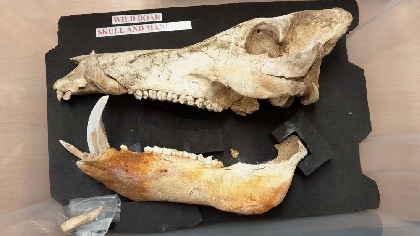
Findings from recent cave excavations on Ingleborough have revealed new insights into the people and animals that once roamed the Yorkshire Dales
The finds include the remains of a Bronze Age Auroch, thought to be the wild ancestor of modern cattle.
The Ingleborough Cave Archaeology Project was part of Our Common Cause: Our Upland Commons, a 4.5 year, 25-partner project, backed by £3 million from the National Lottery Heritage Fund, helping to secure the future of upland commons in the Yorkshire Dales, Dartmoor, the Lake District and the Shropshire Hills.
The Ingleborough project involved a unique collaboration between archaeologists, cavers and volunteers. Led by the Yorkshire Dales National Park Authority Historic Environment Team and the University of Central Lancashire’s Centre for Field Archaeology and Forensic Taphonomy, surveys and excavations took place around a number of Ingleborough’s cave sites and sinkholes.
Archaeologists worked closely with cave explorers, revisiting discoveries from past digs to research and catalogue them to better understand the past environmental conditions and how the caves were used by those who lived and farmed in the Dales prehistory.
Finds revealed that some of the caves had been used as human burial sites during the Neolithic period. One of the most significant finds was the remains of an Auroch dating back to the Early Bronze Age, making it one of the last known of its species. Domesticated cattle remains dating back to the early Stone Age shed light on when the land started to be used for agriculture.
The project highlighted the important role cavers play in uncovering underground history, with some of the chosen cave sites requiring specialist skills to access. This led to a valuable new partnership being developed between archaeologists and the Council for the Northern Caving Community.
Rick Peterson, a caving archaeologist at the University of Central Lancashire said: “The project on Ingleborough has been driven by the caving community. It’s often experienced local cavers who are the first to encounter archaeological finds such as these as they are the only ones who can access the caves. This partnership now ensures that any discoveries made during recreational caving are officially documented.
“It also goes to show the importance of common land, as without public access to our uplands, these kinds of discoveries wouldn’t have been possible.”
While part of the project explored the past, a big part of the project was about looking to the future, engaging today’s farmers in sustainable and adaptive land management practices.
Ingleborough remains one of the few places in England where commoning traditions endure. Thirteen farmers still graze sheep on the land, which is privately owned, under commoner’s rights dating back to the Magna Carta, including a 10th-generation commoner whose practices remain recognisable across centuries.
Project officer Claire Braeburn said: “Ingleborough has a longstanding history as common land, so we wanted to see if the caves held evidence of just how long humans began farming on the fell.
“Over half of England was common land, but now it’s just 3%. This project has helped us understand more about human interaction with the common and the land’s longstanding biodiversity. It has shown how important preserving these ancient practices is or we risk losing them forever.”
The Yorkshire Dales National Park Authority’s Member Champion for Cultural Heritage, David Noland said: “Projects like this not only deepen our understanding of the past but also serve as a reminder of why it’s vital to preserve what little remains of these shared landscapes for our communities and cultural identity.”
Cavers are now being encouraged to report their findings to continue to reveal more about Ingleborough’s history.
For more information about the Our Common Cause project and to view the Ingleborough cave findings, visit https://foundationforcommonland.org.uk/







Comments
Add a comment